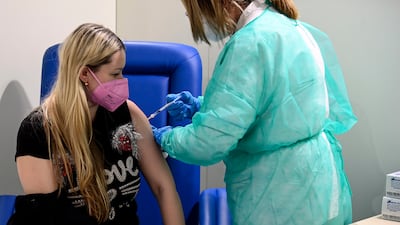New strains of Covid-19 could surface this winter, the EU's drug agency has warned, as it pushed a drive for people to get vaccinated.
The European Medicines Agency said vaccines on the market should offer people a good level of protection from serious illness and death due to the virus.
Newly approved shots adapted to fight the dominant Omicron strain will form part of a booster campaign set to be introduced across the 27 EU nations, before a feared wave of cases during the colder months.
Speaking at a news conference on Friday, Marco Cavaleri, the medicines agency's vaccine chief, said people "should not wait for a specific vaccine" to become available, and instead take what is on offer.
"There might be a completely new variant emerging that we are not able to predict today," he added.
A Pfizer version updated for the now-dominant BA.4 and 5 strains should be authorised in mid-September, while a similar Moderna vaccine is also in the pipeline.

But these new Omicron-adapted doses will largely be reserved for boosters for the elderly, the vulnerable, pregnant women and healthcare workers, Mr Cavaleri said.
The majority of EU citizens will instead be offered the original vaccines that are designed to tackle the strain of the coronavirus first identified in Wuhan, China, at the beginning of the pandemic.
Mr Cavaleri said the original vaccines are "still able to protect against severe Covid-19 disease and death", even if they are less effective at preventing infection.
He said it was "not excluded" that new variants this winter might end up being closer to earlier Omicron strains that had now largely been overtaken by the BA.4 and 5 types.
England’s Covid cases fall to three-month low
In Britain, Covid infections are continuing on a downward trend in most parts of the country, the latest statistics show, and case numbers in England have dropped below one million for the first time since the start of June.
Hospital admissions of patients with Covid are also falling, though health experts have warned the virus is likely to become more prevalent in the autumn and winter.
A total of 1.1 million people in private households in the UK are estimated to have had Covid in the week to August 23, according to data released by the Office for National Statistics on Friday. This is a drop of 25 per cent from 1.4 million the previous week.
Infections hit 3.8 million in early July during the spread of the Omicron BA.4 and BA.5 subvariants of the virus, but have fallen in recent weeks.
“Today’s data shows infection levels continue to decrease across most of the UK, with the number of people with Covid-19 in England now estimated to be under one million for the first time since early June,” Kara Steel, ONS senior statistician for the Covid-19 infection survey, said.
“Though there is an uncertain trend in Northern Ireland, it is too early to say if this marks the end of the recent decrease.
“We will monitor the data closely to understand the impact of schools returning across the UK.”
As the UK braces for an expected new wave, a fresh booster campaign for people aged 50 and over will begin next week, with care home residents first in line.
Northern Ireland is the only one of the four UK nations where infection levels are estimated to have risen in the latest survey, with 35,800 people likely to have tested positive for Covid in the week to August 23, the equivalent of around one in 50.
This is up from 26,400, or one in 70, in the week to August 16.
The latest estimate for people testing positive in England is 893,300, or one in 60, down from 1.2 million, or one in 45.
This is the first time the figure for England has dropped below one million since the week ending June 2.
In Wales, infections stood at 47,300 in the latest week, or one in 65 people, compared with 65,500, or one in 45, in the previous survey.
For Scotland the latest estimate is 96,000, the equivalent of one in 55 people, down from 135,000 or one in 40.
Dr Jamie Lopez Bernal, consultant epidemiologist for immunisation and countermeasures at the UK Health Security Agency, said: “The latest Covid-19 indicators provide more positive news, with continued low levels of case rates and hospitalisations and a sustained downward trend.
“The autumn booster will provide the best protection against Covid-19 this winter and we urge all those eligible – people aged 50 and over and those with underlying health conditions – to come forward when called for their jab.
“The latest evidence shows effectiveness of Covid-19 vaccines against hospitalisation with the BA.4 and BA.5 variant is similar to the protection given for BA.2, and getting a booster dose six or more months after your first two jabs increases protection against hospitalisation by around 60 per cent.”


